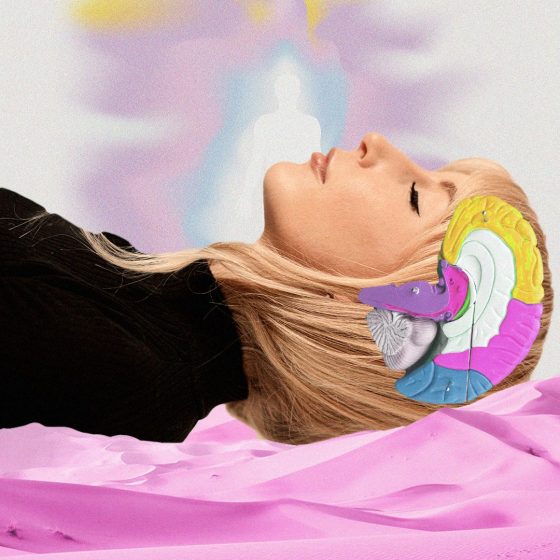There’s a lot of talk these days about sustainability, some conversations and claims more meaningful than others. Refreshingly, with founder Eshita Kabra-Davies, her business, the social fashion rental app By Rotation, speaks for itself. Nonetheless, we were excited to sit down with her to talk about the story behind the app, her entrepreneurial journey, and much more. This interview is the first in a new Restless series on women in business, called ‘Doing the Work.’ Read on for some great insights from this truly dynamic female founder.
Olivia: So, tell me how you came up with the idea for By Rotation?
Eshita: It came from a very first world problem. While I was planning my honeymoon to Rajasthan I started thinking about all the outfits I wanted to wear, so I turned to Instagram, and started thinking it would be really cool to rent some items. My sister, who lives in NYC, used to be a subscriber of Rent the Runway, and I thought, there’s nothing like that in the UK that I’m aware of, and that doesn’t make sense because people here love fashion.
That’s when I started thinking there’s definitely a gap in the market. It wasn’t until I actually went on my honeymoon that I started seeing a lot of textile waste everywhere, so this is beyond all the landfills that we know about just outside of Delhi, this is actually in suburban areas like my hometown, which is two hours away from Jaipur, and that’s when I started to think that I was part of the problem.
I was buying new clothes just to wear for my honeymoon, and who knows if I would actually wear them 12 months later. I’d probably donate them, and we know that 90% of donations end up going back to landfills in so-called developing nations such as my own country. And that’s when I just felt very guilty, and I knew something in me had to change. I started thinking, why don’t we just get people who were posting all these OOTD photos on Instagram to actually share their wardrobes with each other? You never see that item again anyway, so you know, what if they monetised the pieces that they had by sharing, similarly to AirBnb I guess, but with your wardrobe.
Olivia: Did you find it difficult to get people excited about sustainability?
Eshita: Well, in my own friend circle and my network, I had quite a few apprehensive friends who were like “Sharing clothes with strangers? That sounds a bit weird, I’m not sure I’d be into it”. I definitely had people in my friend circle who were unaware of just how much the fashion industry actually needed change. That was probably more of the issue, but if you look at the sustainable fashion sphere, it’s kind of like an echo chamber, everyone you meet at these events is already invested in reducing their consumption, sharing, swapping and renting, so it wasn’t hard to pitch the idea to them. However, our target audience really tends to be the working professional, so it’s been really interesting to get them to realise that actually, they can be much more mindful of their fashion consumption – what clothes they’re wearing, where they’re coming from and who made them
Olivia: I think it’s really powerful that you found so much success in asking your customers to take action. Do you think that there is anything in particular that you did, whether it was your marketing or how you set up the app, that led to this success in getting this engagement?
Eshita: I think one of the things that we did very early on was really keeping the focus on community. We always kept our focus on our users, shining a light on them as opposed to well-known people that don’t actually use the app but might be good to get brand awareness, so we’ve always kept things quite authentic, very user generated, and that’s the way that I always wanted it to be.
Olivia: I think that’s really powerful, especially since I think the common strategy at the moment is to be an aspirational brand, instead of being relatable. Your success has proved that going against that kind of aspirational idea of what a brand should be can be a lot more effective.
Eshita: And I think that’s what I see as well, and maybe it’s because I’m getting old and I’m boring or whatever but the whole millennial pink thing and using supermodels, I personally don’t really care for that. A lot of pragmatic people who are our target audience don’t really care for that either, so we’ve really seen that authenticity is key, which is great because authenticity is also much more cost-effective. So I’m really pleased about that, and I think our community really appreciates how honest and how real we are. We keep things real.
Olivia: So going back to the beginning of your entrepreneurship journey, I know you’ve mentioned in the past that you used to work in finance, now you have a tech company, these are both very male-dominated industries. What has been your experience with that? Have you found it to be more challenging that you’re a female founder in the tech space?
Eshita: In the tech space, I feel like being a female is a very powerful thing, people have their eyes on us. It certainly has been helping as a minority founder. So far I think the tech industry has been very supportive of us, we’re obviously very young but we’ve come a long way, we’ve been the App of the Day, we’ve been featured on the App Store multiple times, we’ve got TechCrunch calling us a consumer rising star, so it’s been really great and all in less than a year, so I do think actually being a female is a power.
One thing that does bother me, was a comment made by a Black female founder who said that she had to give the reins of her own business to a white female because she had built a product that was for the mainstream audience, it wasn’t a product just for black women, and that’s something that worries me.
Olivia: This brings up a really good point, there are a lot of conversations about gender issues in tech, but there aren’t as many about racism in tech..
Eshita: Yeah I felt very disheartened to hear that. I had gotten this comment early in the days of By Rotation, like “Why don’t you do a niche, like Asian wedding rental, and I was like “Why? Because I’m brown?” I don’t even have that many ethnic clothes myself, what are you trying to say? Do you know ClassPass? The founder is Indian. That’s a good example of a minority doing something for everyone.
Olivia: So, this was originally a side hustle for you from what I read in your other interviews, what gave you the push to do this full time?
Eshita: To be honest I was hesitating right up until the day I resigned. My boss actually told me to think about it over the weekend and said I could change my mind if I wanted to. I decided to really just take the lead because I started looking at the numbers and the numbers were really painting a different future for what fashion consumption could be. I could see By Rotation as the largest fashion rental player in the UK and also globally, and there was just a lot of uptake for sustainable fashion and circular fashion. It really seemed to be the right time for it all, with Extinction Rebellion taking the streets, making us really think about what we’re actually doing on the way to work. It felt like the right time in my career as well. Plus I had gotten a dog and I’m obsessed with my dog, so I was like, if I quit I get to be with him!
Olivia: Was there anything that you wish that you had known when you were just starting By Rotation that you know now?
Eshita: I think in this side of the world, in fashion media and tech, I’ve realised that building relationships is very important. Also, you should never discount anyone, whether they’re just starting out and you met them at a networking event, don’t feel like ‘why should I talk to you?’, it all comes around. I’ve always chased every opportunity that I’ve gotten, whether it’s a podcast that a student’s just starting up, and I’m the first guest I’m like, yeah sure, I’ll do it! Answers for your thesis questions? Yeah I’ll do it. I believe in karma and I think all of this contributes to the bigger picture.Especially when you’re starting out, you have to keep going at it and take every opportunity.
Olivia: Sharmadean Reid wrote an article a few months ago about how there’s a double standard for female entrepreneurs, having to almost act as influencers for their business to be successful, whereas men don’t have to do that. Do you think there is pressure for you to be in the public eye for By Rotation to be successful?
Eshita: Oh god yeah, and it’s something that I personally really struggle with. I’ve been speaking to my team about it. Prior to By Rotation, my profile was private. My profile was about me going on holiday, me going out with my friends, going out for dinner, my birthdays, my dog. Now I feel like I’m using it as a platform to brag about how well I’m doing and how well my business is doing, and personally that’s not really me, I prefer to keep things authentic. I love that Sharmadean shows the pitfalls and life beyond entrepreneurship, I think that’s important.
For me, I feel like it gives me a sense of perspective, you know, not everyone cares about your business every single day, I know that you do, but not everyone gives a shit.
Olivia: Okay let’s talk about leadership, because I often notice that female entrepreneurs don’t get asked anything about leadership. So I would love to ask, what is your leadership style and do you have any tips for female founders who aren’t really sure about how to navigate suddenly being in charge of a company?
Eshita: I think I’m pretty particular on certain things, but I’m very open to suggestions from my team members, and a lot of the time I end up doing what they recommend. I like to think that keeps them motivated because they see that they truly add value and they truly complement what I’m lacking. I think I’m very easy going, I’m not a micromanager, I actually leave things quite open and broad, we build things together. By Rotation is a good place to work for at the moment, I think everyone is very driven by the mission, and they fully understand what I’m going for and what I want and I think that’s beautiful. If you can align people, the right people, to the mission, they will do things that you could never even imagine with their skill set. I think that’s how we do really well as a team, by being given freedom, with me checking in to see if it aligns with our vision and raison d’etre.
Olivia: It sounds very collaborative, and sounds like you’re a great boss. What do you think is the main reason for your success while other apps have not succeeded?
Eshita: We’re all about making rental a very regular, day-to-day thing. It was very important for me to include everyone, to make the prices affordable to compete with fast fashion, because that’s the reason that people buy fast fashion. It’s not because they like lower quality items, it’s not because they love the brand, it’s because that’s what they can afford. It’s all about making the price point accessible for people of all socio-economic backgrounds, and that’s what I think we’ve done really well. I feel like we’ve always been taking the right steps, guided by our core values of community and sustainability, and that’s really what’s driven people to be attracted to us. Now we have over 35,000 users on the app in the UK, and the business is bootstrapped so we haven’t really spent much on marketing and customer acquisition. That really shows you that people do actually want to try out a solution and we’ve built a platform that enables them to try it out.
Olivia: And lastly, when do you feel most powerful?
Eshita: I feel most powerful when I am able to celebrate my individuality without worrying what others will think of me. Authenticity is one of the values I place highest, so it’s important for me to feel that I am being true to myself. I also know the pitfalls of herd mentality and I shy away from conforming.









